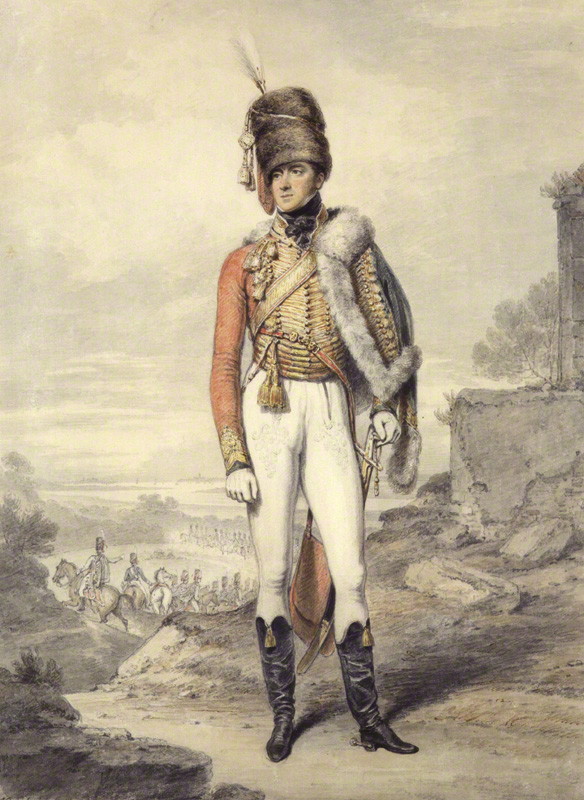

 If he were around today, Henry Paget, Earl of Uxbridge and 1st Marquess of Anglesey, would probably feature regularly in the supermarket tabloids.
If he were around today, Henry Paget, Earl of Uxbridge and 1st Marquess of Anglesey, would probably feature regularly in the supermarket tabloids.
The Regency beau and dashing cavalry officer is perhaps best known for his (probably apocryphal) exchange with the Duke of Wellington at the Battle of Waterloo. The two of them were viewing the battlefield when a cannonball came flying at them.
Paget looked down and said, “By God, I’ve lost a leg!”
Wellington looked down and said, “By God, so you have.”
However, long before that sterling example of the British stiff upper lip, Paget had won quite a reputation in society.
As a young man, he was elected to a seat in Parliament in 1790 and went to London, where he was a popular member of the Prince of Wales' (Prinny) set. Paget soon developed a reputation as a bit of a dandy. A foreign diplomat wrote home rather shocked at overhearing Paget and a friend deep in a serious discussion of what to wear at an upcoming event.
The Regent once complained to his tailor, “Why can’t you make my coats fit like Paget’s?” Presumably the tailor had enough sense not to suggest that the Regent lose fifty pounds and get some exercise.
When the French Revolutionary Wars broke out, Paget raised a regiment and gained rapid promotion until by 1808 he was a quite successful lieutenant-general in the cavalry, fighting in Spain. However, his military career was ended by scandal in 1809.
Back in London, he made the acquaintance of Lady Charlotte, wife of Henry Wellesley, who was Wellington’s youngest brother. Paget began to give her riding lessons, which in turn led to a notorious affair. Lady Charlotte (Char) and her husband already had five children, and Paget, who was also married, to Lady Caroline (Car) Villiers, had eight. Nonetheless, they eloped.
Wellesley offered to take her back, but Char declared that since she was not “lost to all Sense of Honor" she could not return to the husband and children she had abandoned.
Paget’s family also intervened, blaming Char and supporting Car, but couldn’t persuade him to return to his wife and children. Henry Cadogan, Char’s brother, challenged Paget to a duel, in which Paget deloped and Cadogan missed, so honor was satisfied.
In the trial for criminal conversation, Paget offered no defense, damages were assessed at 20,000 pounds, and Wellesley was then able to obtain a divorce. He never entirely escaped the scandal, however. Even when he died in 1847 after a long career of government service, his obituary in The Gentleman's Magazine rehashed the scandal and devoted much of its space to the gallant behavior of Paget: “counsel for the defendant stating that his client instructed him to say that he had no defence, that he wished to urge no grounds of extenuation, and would make no attempt to reduce the damages.”
The situation was a bit more difficult for Car, but since Scotland allowed a woman to divorce her husband, they all moved to Scotland. There Car obtained her divorce, Paget and Char married, and Car married the Duke of Argyll.
After all that, Wellington did not want Paget back in Spain. Even without the scandal involving Wellington’s sister-in-law, Paget was not the sort of commander Wellington liked—dashing and showy. The duke preferred sensible and experienced. Nonetheless, Paget still had the favor of the Regent, and when Napoleon returned from exile, Paget was put in charge of the allied cavalry whether Wellington liked it or not. The duke stormed out of the room and said, “That fellow has a habit of running off with people. Well he won’t run off with me!” It is, perhaps, not surprising that Wellington could view the Paget’s loss of a leg with such equanimity.
After the amputation, which Paget bore stoically, he said to the friends gathered round him, “I have had a pretty long run. I have been a beau these forty-seven years and it would not be fair to cut the young men out any longer.”
The leg received both a burial and a headstone on the field of Waterloo.
Three weeks later, he was back in London, and the Regent, declaring that he loved him, made him Marquess of Anglesey. Eventually he wore an artificial leg, invented by James Potts. Articulated at the knee, ankle, and toes, and known as the Anglesey leg, Potts’ invention was still in use a hundred years later.
To show his appreciation of all the good wishes he had received during his recovery, the new marquess decided to give a grand entertainment. He and his wife oversaw all the preparations, but just before the guests were to arrive, Lady Anglesey, the divorced wife who could not appear in society, set out for the country. Lord Anglesey, “too gallant and affectionate to leave his wife in solitude,” according to the Comtesse de Boigne, accompanied her. The guests were greeted by the daughters of the first wife, and the Misses Wellesley, daughters of the second wife by her first husband.
“It must be admitted that a stranger idea could hardly be conceived than that of inviting people to one’s house under such circumstances,” the Comtesse concluded.
In 1817, his daughter, Lady Caroline Paget, married Charles Lennox, future Duke of Richmond. Jane Austen wrote to her niece Fanny Knight, “If I were the Duchess of Richmond, I should be very miserable about my son’s choice. What can be expected from a Paget, born and brought up in the centre of conjugal infidelity and divorces? I will not be interested about Lady Caroline. I abhor all the race of Pagets.”

Comments
Truth is stranger than
Truth is stranger than fiction! If someone put this in a novel, people would say it was over the top.
Post new comment